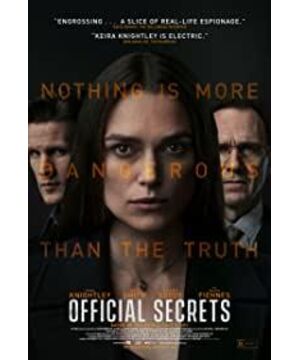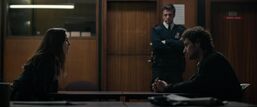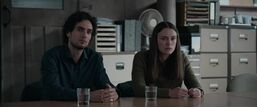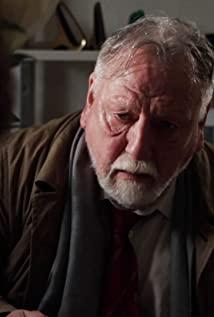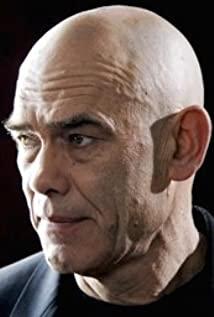I've been in love with simple dramas lately.
Because most of them are based on a true story, the feeling of being able to be personally substituted is stronger, and it will give more thinking to reality; in addition, there is not much emotional catharsis, and there is no so-called "personal heroism". You can see the struggles and choices of many ordinary people in this, and let yourself have an intuitive self-examination.
The movie "Official Secrets" is such a simple drama.
Katharine Gun, a former translator of the British intelligence agency GCHQ, who understands Chinese, received an email in 2003 asking her to monitor members of the UN Security Council to help the United Kingdom and the United States gain a rationale for the Iraq War, but Gun sent the email. It was leaked to anti-war partners, and later circulated to the media. After the release, it caused an uproar, and Gun was also prosecuted. Even if he was eventually acquitted, the war was already a fact. True to form, Iraq is still devastated, with no obvious heroes and no real changes.
Yes, he is just such an ordinary person, without an earth-shattering background, without an IQ, and without a well-thought-out plan; he was involved in something that was actually very common but also very unusual, and she used her. The way you think you should do it, in the end, an ordinary person's choice and persistence can't change anything? So what's the point?
KK, who is stunning on the screen in a green dress, made me wait for my knees to lick. In this film, I contributed the lowest face value in history. Not only the actors have no makeup, but the technique of the whole film is also very ordinary. It even feels a little boring.
But it is such a film, combined with the recent outbreak of Wuhan pneumonia, that makes me think a lot.
In the face of the grand historical process, ordinary people are still insisting on those small, real, and sticking to the conscience in their hearts.
I still remember that after the fall of the Berlin Wall, during the interrogation of the officer who shot and killed civilians in East Berlin, the judge pointed out in court: "The police are guilty of not obeying the orders of their superiors, but they are not guilty. As a sane person, then You have the right to raise the muzzle of the gun by one centimeter at any time, which is an obligation of conscience that you should take the initiative to undertake."
Rethinking "the muzzle is raised one centimeter" is perhaps the biggest reflection this film has given me.
When Gun knew that leaking the email was treason, she still copied the email to an anti-war friend. I was actually suspicious of her motives at the time: Did she want to be a personal hero too much without considering the interests of the whole country? But when the investigation team came over and questioned one by one, she could play well without any flaws, but in order not to let other colleagues suffer for her, she took all the pressure and took the initiative to confess what she had done.
This choice made me think: would I choose to confess? If I believed that I was right and that war was evil and should be opposed, would I enjoy the feeling of "anonymity" with peace of mind? Will I weigh the pros and cons of imagining the consequences and choose the side that is in my favor?
As in the film, Gun's human rights lawyer Ben Emmerson says: "When you know the consequences of your decision, you're going to lose everything, your husband, your job, your reputation and your status, but you still make your decision. It's a gamble where you can lose everything and get nothing, and you still stick to the conscience you believe in, and I have a lot of respect for that."
Ordinary people don't have the opportunity to influence the world, but we make trade-offs and make decisions every day, even in the smallest of things. Carefully recalling our daily decisions and actions, we compromise too much, just to make room for more survival - we need a "job" and the "like and approval" of others, and we need to choose what to say carefully Whatever you do, don't let yourself offend others, handle relationships well, and be tactful.
But in the process, I slowly lost my own principles, I felt that anything is OK, and more importantly, "As long as it doesn't affect my (interests), anything is OK"!
Facing the boss's unethical decision-making, facing the more sophisticated way of dealing with competitors, facing family members, facing friends...
What is the ruler in your own mind?
What can't be compromised? Is it unbearable?
Who are you speaking for? What do you value? What principles do you want to uphold?
In fact, what we need most is two things:
One is the courage to criticize and question, the other is the persistence to constantly cultivate one's conscience
It's hard for me to imagine that it's always been "as long as it doesn't affect my (interests), anything is fine"! Will the people who are in need stand up and pursue the justice in their hearts at critical moments? Will you really bear all the consequences? Action is a habit, and a habit needs to be cultivated day after day.
Reflect on myself carefully, I don't think I have the courage right now, in this case, I won't come forward, I'll just be a coward, hide behind, not do anything wrong, and can't do anything right matter.
And in 2020, I want to be a more principled person, a big mouth, a person who is hated but more respected by myself.
View more about Official Secrets reviews


